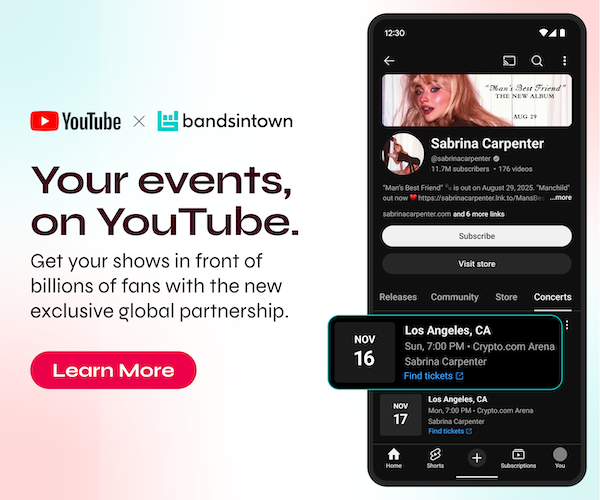The following MBW op/ed comes from Stef Van Vugt (pictured), the founder and CEO of Fruits Music, a label-cum-playlist company that has racked up tens of billions of plays on Spotify and other services. Netherlands-headquartered Fruits Music is home to playlist brands such as Dance Fruits and LoFi Fruits, and is represented by its famous Melon brand identity. You can listen to a popular MBW podcast interview with Stef Van Vugt from earlier this year through here.
It should come as no surprise that artificial intelligence (AI) is now capable of generating stunningly beautiful still images from creative text.
If this is news to you, I recommend you spend a few hours reading about the nonprofit artificial intelligence research organization OpenAI for an insight into how video and more complex forms of art such as music will soon fall under the remit of AI.
Training a neural network and learning capability isn’t linear – it’s exponential. It is therefore reasonable to assert that we will soon see AI-generated music becoming an increasingly cost-effective alternative to human creativity.
Let me be clear: I am not claiming to be an expert in this field. But you don’t have to be a visionary to anticipate the potential effect of AI on the wider creative industries including music or to acknowledge the tricky questions that are starting to arise around the topic.
For example: Who owns the copyright from AI-made music? Is it…
- The creator(s) of the AI?
- The trainer(s) of the AI’s neural network?
- The owner(s) of the platform/company behind the AI?
- The AI itself?
- The user “producer/artists/musical fan, etc…” using the AI to help create/finish an original song or translate a story or emotion into a song?
- The millions of fractional owners of copyright the AI initially trained its neural network on?
- The public domain whereby you and anyone else would have a non-exclusive license to exploit it?
Variables that may change your answer/opinion on the above may include: What has a given AI’s neural network been trained on or informed by? Is it:
- Music within the public domain?
- The artist(s)/producer(s) solely owned catalog?
- Text, pop culture and other public domain data/assets?
It is not a secret (or necessarily a bad thing) that the world’s biggest artists and brands today use human co-writers, ghost producers, mixers, engineers, A&Rs, and other professionals to help them translate their emotions and stories into songs for their fans.
But what if artists and producers could train an AI system to replicate their emotions, story, or whatever else they want to create into a fully-produced, voiced, mixed, and mastered release-worthy song?
The DSP question
What if western DSPs began populating their own platforms and editorial playlists with AI-generated music created by themselves? This would leave even less room for human creativity to be displayed on these services, and give big tech even more control over what’s being consumed.
This already appears to be happening in China. A recent article in Music Business Worldwide stated that Tencent Music’s streaming services now host over 1,000 songs with AI-generated vocals. All of these tracks have been created by Tencent Music’s own AI technology, and are cumulatively amassing millions, if not billions, of plays. If this had happened on western DSPs like Spotify or Apple Music, I believe the major record companies would have reacted very differently.
“Tencent Music’s streaming services now host over 1,000 songs with AI-generated vocals.”
Even the most basic questions about AI are not currently being addressed by the music industry or by copyright professionals. Currently, a human creator is typically the legal entity that claims copyright and/or collect royalties derived from the exploitation of music rights.
What happens, then, when the music industry’s antiquated royalty systems are required to process AI-driven music?
The major label question
The rise of AI will have many benefits and drawbacks for everyone in the industry. But one major talking point is obvious: the major labels are sitting on top of a largely unexplored and under-exploited gold mine of catalog and intellectual property. Much of this IP has been frozen under a glacier for almost a century.
Up until now, no one company has been able to mass-create and market original catalog that is of such a scale and a premium standard that it can compete with the majors in a meaningful way. Additionally, we haven’t seen a situation where AI is able to produce a limitless number of cover versions and/or re-interpretations of catalog music – potentially boosting, but also potentially diluting, the value of original works over time.
“Up until now, no one company has been able to mass-create and market original catalog that is of such a scale and a premium standard that it can compete with the majors in a meaningful way. Is AI about to change that?”
Is AI about to change all of this? Maybe. Perhaps data scientists and creative minds are already training AI neural networks that will produce thousands of hits a day. Perhaps tech like this will become the defining smash ‘songwriter’ of tomorrow.
Let’s face it: when everyone has access to the same resources to create great musical art thanks to AI, the world’s very best marketeers, data scientists, storytellers, and brand builders will excel in this new iteration of the music industry.
The Fruits Music roadmap
Our mission at Fruits Music over the next 5 to 10 years is to thrive in this New Music Business – and to hire a world-class team of the very smartest people to make that happen.
In my view, since the dawn of the commercial music industry in the 1920s, no commercially successful rival to the established major label catalog system has ever been established. We believe we can change that, and that AI will play a significant role in our chances of making it happen.
Next year, Fruits Music will embark on a journey that we sincerely believe will see us grow into one of the largest music companies ever created.
First, our aim is to become the fourth-largest recorded music rights company in the world. Once that’s accomplished, we’ll aim to dethrone the three major music companies, too.
Here are just a handful of the things we will be focused on in 2023:
- Developing our ‘artist’ and brand “MELON” into the world’s largest, ‘masked’ streaming, and, eventually, virtual touring artist;
- Creating and releasing the biggest and most successful dance album in history;
- Reimagining the covers album market of the 1960s, 1970s, 1980s, and 1990s – but in the context of digital streaming;
- Putting together a world-class team to execute our vision for the next five to ten years;
- Creating the best media products for our fans while developing non-exclusive agreements with the producers, creators, suppliers, and/or partners we work with. We will help them share the spotlight, receive master & publishing royalties (and non-recoupable advance payments), and, most importantly, will ensure they benefit from a platform and marketing funnel that makes certain their creativity rises above the pack.
For these ambitions to become reality, AI and its growing impact on the music business will doubtlessly play a major role.
We have already started this journey, with the internal launch of EverywhereAI – Fruits Music’s proprietary SaaS marketing tech. We have developed EverywhereAI over the past two years, and it continues to evolve, getting smarter by the day.
Indeed, we are now designing and developing products (including music, mobile games and apps like Sleep Fruits, alongside desktop entertainment such as FruitsCraft) that are specifically designed to take advantage of EverywhereAI.
For any modern music business to rapidly grow – whether ambitious indies like Fruits Music or the ‘Big Three’ majors – they must be prepared to embrace, and evolve alongside, the coming AI music revolution.
Watch this space.Music Business Worldwide





